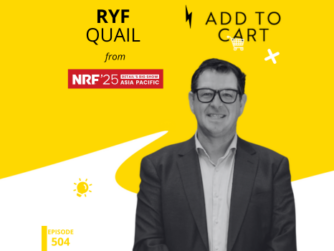In this episode of Add To Cart, we are joined by Gavin Ballard, Co-founder and Co-owner of Submarine
Submarine is a Shopify add-on that helps brands and agencies push the limits of what ecommerce platforms can do for subscriptions, membership crowdfunding and more. It’s a unique and fascinating approach because it is essentially giving developers and agencies the keys to create unique experiences – rather than delivering it straight out of the box like many other apps. It is doubly interesting because Gav is also the founder of ecommerce agency Disco Labs, which has helped develop ecommerce experiences for leading brands such as JB Hi Fi, YouFoodz and Lovisa. I really wanted to get ecommerce nerdy in this episode and drill into what composable commerce, flexible commerce, headless commerce actually is – and how retailers should consider it. So if you are like me and have a basic understanding of these terms but are still a bit foggy on it all, this should help clear that up. And it is important – especially if you are making decisions around tech investments, tech partners and skillsets you need on your team. We also cover Gav’s favourite Shopify themes (from his best selling but now out of date paper, The Definitive Guide To Shopify Themes and how he ended up in the office of Shopify CEO Tobi Lutke ( Lootka) – juicy.

“I think it’s about the tech not getting in the way of the merchant anymore.”
Gavin Ballard
Different tools working well together
“To give you what my take on composable commerce is, it’s an observation that over time,
there’s definitely a lot more complexity involved and this trend that we had over the past maybe five or ten years of bundling of commerce functionality into these single use platforms, like those Swiss Army knife platforms that’ll do everything for everyone, that’s starting to get unbundled, because merchants really need a best in class tool for everything.
You can’t have one system that is your checkout and your and your email platform. They’re all quite specialised things and you really wanna have the ability to pick the best in class across that.
So to me, Composable Commerce is saying, given that, how do we make sure that these different tools work together well? They talk to each other so that if I wanna swap out one email marketing provider for another, I can do that with minimal disruption to my business and as a result, in the market, I’m able to deploy an e-com site to a completely new region in a matter of weeks rather than months or years. And so it’s all about having some sort of common framework or glue that says this is how these different pieces work together and how they do that well.”
A composable approach
“Shopify is an obvious choice for a smaller business that’s starting out. And then Shopify email is a perfectly serviceable tool for email marketing for a small brand. But I guess it’s picking the tools and thinking, okay, this is what I need right now. If I get to this stage, what am I gonna need? I think I’m going to need this and how difficult is it going to be to switch? And could I make a different choice now that’s going to make that a bit easier down the line? So that’s all it takes to really take a composable approach to how you’re building your tech stack as a merchant.”
Give merchants the building blocks
“We see it as we’ve got these Lego building blocks. And the philosophy of the platform is we let the merchants put them together how they want. And some of that can be done just out of the box natively with submarine. Some of it’s going to require a bit of custom code. Some of it might require an external API call.
Having the building blocks there and exposing them at the most basic primitive level to the people that need them. That’s a very different development and approach than I think most apps on the app store for understandable reasons. But because we’re really targeted at those use cases, we can do a much better job of it than they can.”
Links from the episode
- One Inch Round
- MACH Alliance
- Commerce Tools
- Switch Themes
- Maestrooo
- Shopify Plus (sponsored)
- Packleo (sponsored)
This episode was brought to you by…






